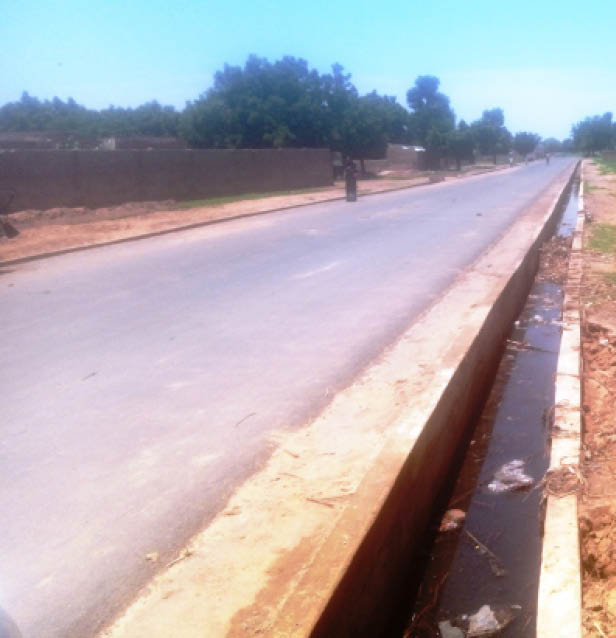We must do more to save lives on our roads
The contribution of road accidents to Nigeria’s mortality rate was recently captured by this newspaper in a story titled ‘Auto crashes claim 385 lives in 3 months’. Several others sustained injuries, with many becoming permanently incapacitated. The data analysed by the newspaper showed high casualties in Bauchi, Kebbi, Niger, Lagos and Kano states, with Bauchi […]

Access roads to some villages constructed by agro-commodity market at Gezawa
The contribution of road accidents to Nigeria’s mortality rate was recently captured by this newspaper in a story titled ‘Auto crashes claim 385 lives in 3 months’. Several others sustained injuries, with many becoming permanently incapacitated.
The data analysed by the newspaper showed high casualties in Bauchi, Kebbi, Niger, Lagos and Kano states, with Bauchi leading with 98 fatalities, followed by Kebbi 53, Niger 39, Lagos 25, and Kano 23. A further breakdown showed that March recorded the highest casualty figure with 186 lives lost, followed by January with 175, while February had the lowest casualty figure of 24 deaths.
That the story was based on reported cases (in newspapers) between January and March this year, means that the figure may be significantly higher as many fatalities on our roads go unreported. A few days after the report, the Federal Road Safety Commission (FRSC) gave an official figure in a report by an online medium which stood at 1,349 deaths between January and April 12, 2023. It further disclosed that 2,463 crashes occurred during the period.
According to the FRSC, the crash involved 3,965 vehicles conveying 16,102 people. Out of that number, 1,349 people were killed, while 7,744 got injured.
This figure is indeed alarming and should worry all Nigerians. Several factors – mechanical, environmental and human – have been identified as responsible for the accidents happening on our roads, including poor law enforcement, excessive speeding, overloading, driving under the influence of alcohol or in a state of fatigue; use of second hand and expired tyres, bad roads and unsafe vehicles.
There are also issues of licensed but untested drivers, night journeys without proper lighting, underage drivers, and articulated vehicles, especially those carrying containers without recourse to safety, among several others.
The Corps Marshal, Federal Road Safety Corps (FRSC), Dauda Ali Biu, recently admitted to issues with the data being churned out by the FRSC, in comparison to global bodies like the World Health Organisation and the World Bank. He confirmed that “Our coverage was also limited. So, there could be crashes that could have happened and might not be captured in our own data. Based on that report, we started working with the police and visiting hospitals.”
The bitter truth is that right now, the presence of the FRSC is not felt as expected because we still see things we should not be seeing on our highways. Commercial vehicles with worn-out tyres carry excess passengers without any regard for safety. It is also very common to see trucks conveying goods, animals and human beings dangerously perched on such vehicles on the same highways where FRSC personnel operate. Things like these have continued to give credence to the allegations of corruption against some of the agencies saddled with ensuring safety on our highways.
The FRSC should live up to the objectives of its establishment, which include preventing or minimizing accidents on the highway, clearing obstructions on any part of the highways, and educating road users on the proper use of the highways among others.
Engagement between the FRSC and other stakeholders such as the National Union of Road Transport Workers (NURTW) and the Nigerian Association of Road Transport Owners (NARTO) is commendable and should be sustained. A lot can be achieved through education.
The FRSC should also start providing roadside and mobile clinics for the treatment of accident victims free of charge, which is part of its responsibilities. Many victims die due to distance to healthcare facilities where they can receive urgent attention.
The issue of enforcement should also be taken more seriously. Driving licenses must never be issued to those who do not earn them. The practice of assistants (motor boys) graduating to become drivers overnight must not be allowed to continue because many experts have identified the presence of untrained drivers as a major cause of road accidents.
The FRSC should also rethink its position on night travel and start deploying officers for night duty accordingly. Many now use the cover of the night to violate traffic rules and regulations, thereby endangering their lives and those of other innocent road users. They can make it a joint patrol with sister agencies that are armed for the purpose of security.
The Standards Organization of Nigeria (SON) recently said it destroyed 10 million substandard tyres in six months out of 40 million used tyres across the country. We urge the organisation to continue the fight till all the other 30 million are destroyed and to liaise with relevant bodies to prevent substandard vehicle parts from gaining access into the country. The vehicle inspection offices in the various states of the country should also step up their vehicle inspection duty.
The government on its part should pay attention to the state of our road infrastructure and ensure that they are in good condition.
Finally, motorists must be careful while on the wheel and observe all traffic rules. Passengers should also play their part by reporting erring drivers to the authorities. We must all work together to check accidents on our roads.
